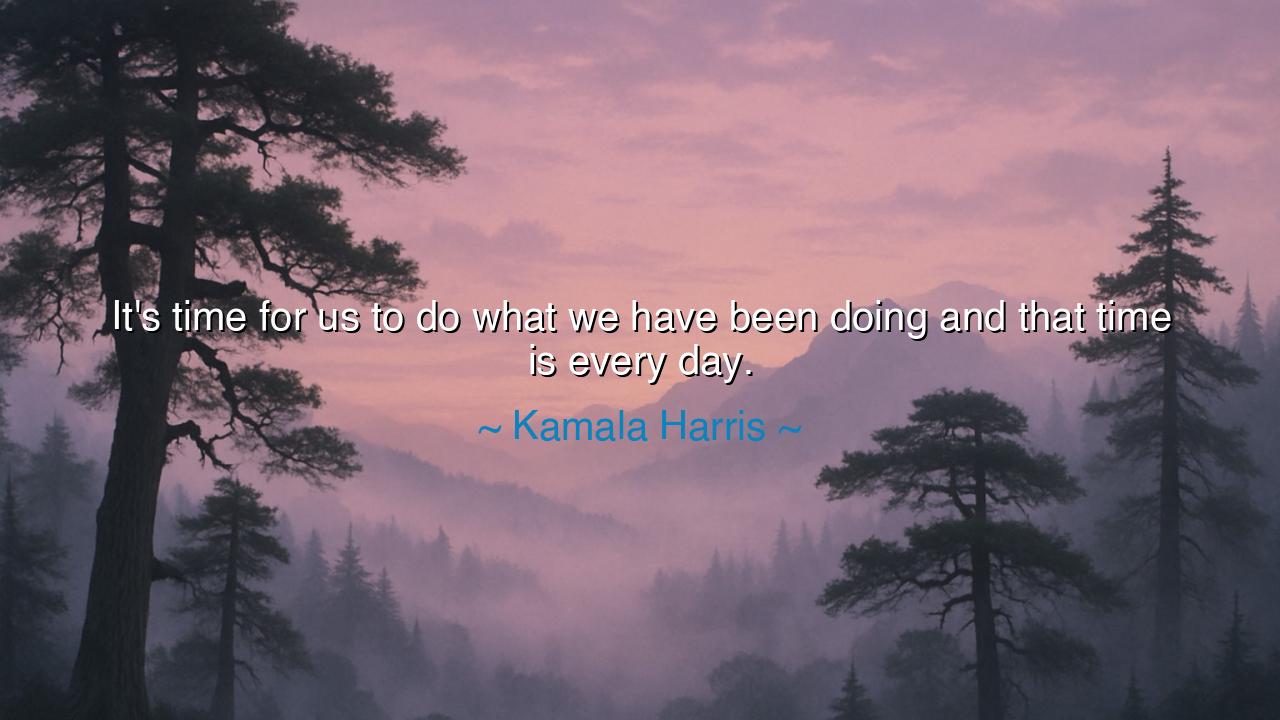
It's time for us to do what we have been doing and that time is






Hear the words of Kamala Harris, spoken with urgency, though tangled in the rhythm of speech: “It’s time for us to do what we have been doing, and that time is every day.” At first, the phrase seems circular, almost puzzling, but listen with the ears of wisdom and the meaning grows clear. For she speaks of constancy, of the daily labor that shapes great change, of the truth that the battle is not won in one moment but in the steady rhythm of perseverance. The call is not for a single effort, but for endurance—a commitment to rise each dawn and to do again the work that must be done.
The ancients, too, praised this kind of discipline. Did not Aristotle teach that excellence is not an act, but a habit? That what we repeatedly do, we become? To act only once in passion is easy, but to rise each day with purpose, to walk the same path of virtue again and again—that is the root of greatness. Harris’s words, though clothed in modern speech, carry the same wisdom: the time for right action is not rare or occasional, but daily.
Consider the life of Mahatma Gandhi. His movement for India’s freedom was not built upon one great act, but upon countless daily choices—marching, fasting, spinning cloth, enduring imprisonment. He did what he had been doing, every day, with steadfastness. The world marveled at his victories, but the secret was not in sudden miracles; it was in the quiet, relentless rhythm of discipline. His constancy embodies Harris’s call: the time for action is not tomorrow, nor in some grand event, but now, and every day.
So too in the life of Rosa Parks. Her refusal to give up her seat was but one moment, but it was the fruit of years of quiet resistance, of daily courage, of “doing what she had been doing.” And when her act sparked a movement, it was sustained not by a single flash of defiance, but by communities rising each morning to boycott buses, to walk to work, to persist in the face of hardship. Their strength was not in one gesture, but in endurance—their time was every day.
But hear this warning, O seekers of truth: many dream of change but wait for the perfect hour. They say, “Tomorrow I will begin. When the time is right, I will act.” Yet the right time never comes, for they forget that the only true time is the present, and the only way to victory is through the discipline of daily labor. To wait for the ideal hour is to waste the hours given. Harris’s words remind us that the time is not later, not someday, but every day.
The lesson is plain: greatness is not built by single moments of glory, but by the steady repetition of duty. To practice kindness, to labor for justice, to build one’s craft, to strengthen one’s body or soul—these are not things accomplished once, but cultivated daily. Like drops of water wearing down stone, daily acts of persistence carve the shape of destiny.
Practical wisdom lies before you: choose each day one task, one discipline, one act of goodness, and do it without fail. Rise each morning and recommit to your path, whether in study, in labor, in service, or in love. Do not despise the repetition, for repetition is the forge of transformation. Keep walking, keep building, keep striving. For the time is every day, and by such steadfastness, the impossible is made possible.
Therefore, let Harris’s words echo within you: “It’s time for us to do what we have been doing, and that time is every day.” Do not be dismayed by their simplicity. In them lies a profound truth—that change is born not of rare inspiration, but of daily discipline. Embrace the work, honor the rhythm, and know that each day lived with purpose is a stone laid in the foundation of eternity.






AAdministratorAdministrator
Welcome, honored guests. Please leave a comment, we will respond soon